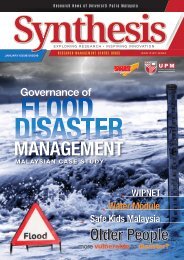SYNTHESIS 1/2020: CLIMATE CHANGE & DISEASE SHIFT IN MALAYSIA
Biomedical and health sciences research has always been the centre of focus in many countries for centuries. In fact, a portion of the tax-money has been allocated to research and development (R&D) in the country to improve the health and well-being of the people. The importance of R&D can be seen with the recent pandemic of COVID-19, which has swept the world with fear of the disease. Many parties are working together to curb the outbreak; healthcare providers nursing and treating the patients, scientists developing the virus detection system and vaccines, engineers creating tools for temperature detection and surface sanitising machine, and many more. All this expertise and creativity come from years of experience and hard work in R&D to create a better future for the nation and mankind.
Biomedical and health sciences research has always been the centre of focus in many countries for centuries. In fact, a portion of the tax-money has been allocated to research and development (R&D) in the country to improve the health and well-being of the people. The importance of R&D can be seen with the recent pandemic of COVID-19, which has swept the world with fear of the disease. Many parties are working together to curb the outbreak; healthcare providers nursing and treating the patients, scientists developing the virus detection system and vaccines, engineers creating tools for temperature detection and surface sanitising machine, and many more. All this expertise and creativity come from years of experience and hard work in R&D to create a better future for the nation and mankind.
You also want an ePaper? Increase the reach of your titles
YUMPU automatically turns print PDFs into web optimized ePapers that Google loves.
Climate Change and Its Impact on Health in Malaysia
There is currently a strong scientific consensus that the
Earth is warming and that this warming is mainly caused
by human activities. This consensus is supported by
various scientific studies and by the position statements
of scientific organisations, many of which explicitly agree
with the Intergovernmental Panel on Climate Change
(IPCC) synthesis reports.
Climate change is a long-term alteration of temperature
and typical weather patterns in a place. Climate change
is a major aspect of global warming which is the
ongoing rise of the average temperature of the Earth’s
climate system and has been demonstrated by direct
temperature measurements and by the warming of the
earth. It is believed to alter weather patterns on the
regional scale, giving rise to extreme weather events. The
impacts of extreme weather events are more acute and
traumatic in nature, leading to deaths and injuries, as well
as debilitating and fatal communicable diseases. Extreme
weather events include heat waves, cold waves, floods,
droughts, hurricanes, tropical cyclones, heavy rain, and
snowfalls.
Climate change and air quality are closely related.
Climate change can deteriorate air quality by increasing
or concentrating the pollutants in the stratosphere (lower
atmospheric layer). Air pollution can cause adverse
impacts on human health and the ecosystem. A direct
impact could be deaths due to heat stress or respiratory
diseases due to air pollution, while indirect effects could
include increased food and water-borne diseases,
resulting from changes in the rainfall pattern).
The effect of climate change on health is an area of
substantial concern in Malaysia. There are six prominent
climate-sensitive diseases in Malaysia, namely, cholera,
typhoid, hepatitis A, malaria, dengue and chikungunya.
The resulting health impacts can be expressed as
vector-borne diseases, rodent-transmitted diseases,
malnutrition and respiratory diseases. Understanding the
complex linkages between climate change, environmental
modifications, environmental impacts, and health impacts
is critical in planning for mitigation and adaptation
plans. Heavy rains create insect breeding sites, drive
rodents from their burrows, and contaminate clean water
resources. The incidences of mosquito-borne parasitic
and viral diseases are among those most sensitive to
climate. Climate change affects disease transmission by
shifting the vector’s geographic range and by shortening
the pathogen incubation period. Flooding has been
associated with outbreaks of leptospirosis.
There are six prominent
climate-sensitive
diseases in Malaysia,
namely, cholera, typhoid,
hepatitis A, malaria,
dengue and chikungunya.
Prof. Dr. Zailina Hashim
Department of Environmental and
Occupational Health
Faculty of Medicine and Health Sciences
Tel: 03-9769 2395
Email: zailina@upm.edu.my
SYNTHESIS 2020 | 21










